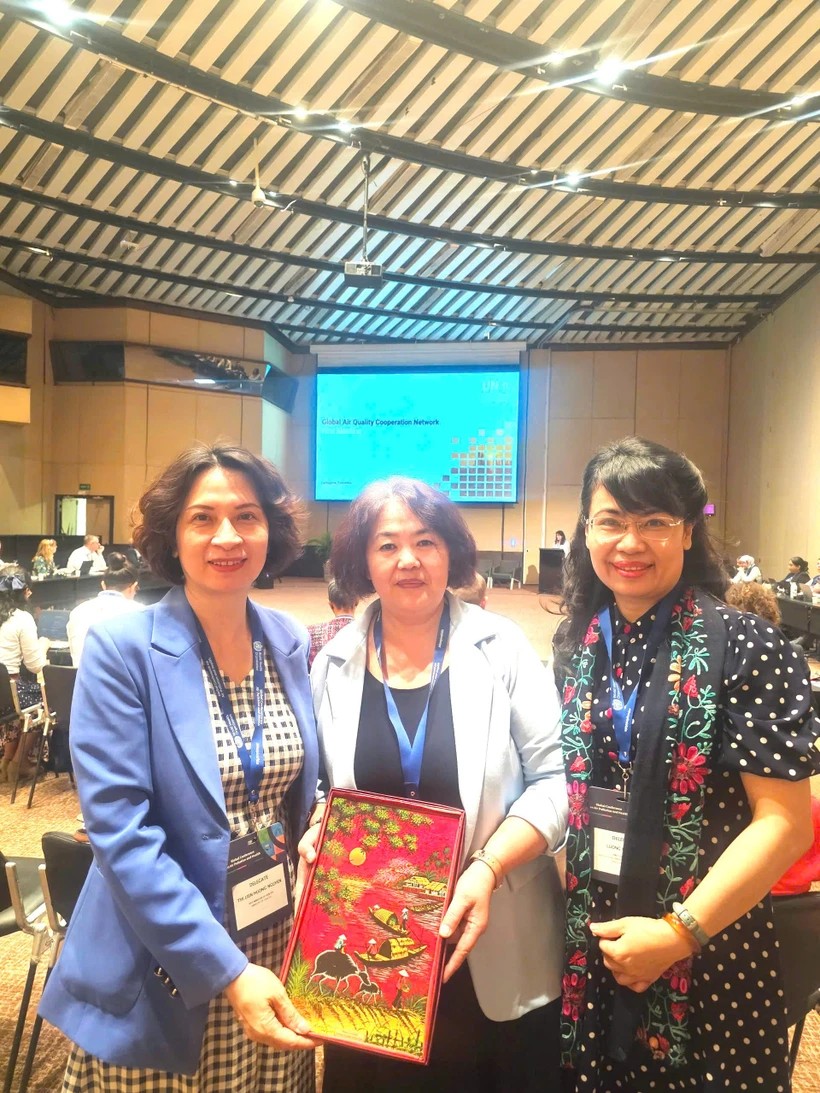 |
| Deputy Minister of Health Nguyen Thi Lien Huong (left) and the Vietnamese delegation at the 2nd Global Conference on Air Pollution and Health in Cartagena, Colombia. (Photo: Ministry of Health) |
A delegation from Vietnam, led by Deputy Minister of Health Nguyen Thi Lien Huong, actively contributed significant initiatives at the second Global Conference on Air Pollution and Health in Cartagena, Colombia. Their participation emphasized Vietnam’s proactive stance in tackling this global issue.
The event, held from March 25 to 27, convened senior leaders from various countries to devise strategic solutions for addressing air pollution and safeguarding public health. It specifically focused on assessing the health impacts of air pollution, particularly on vulnerable populations.
Vietnamese delegates engaged in discussions with global health leaders and environmental experts to find ways to reduce air pollution. Key proposed measures included promoting clean energy transitions to reduce fossil fuel dependence, developing sustainable transportation, curbing vehicle emissions, efficiently managing industrial and household waste, and tightening regulations on industrial emissions control.
There was a shared consensus among the delegates that global efforts to combat the air pollution crisis, which poses a significant threat to public health, remain insufficient.
Colombian Deputy Minister of Health Jaime Urrego underscored that air pollution is not an isolated issue but a consequence of a development model reliant on fossil fuels, exacerbating inequality and causing harm to the planet.
According to the World Health Organization (WHO), air pollution is responsible for approximately 7 million deaths globally each year and increases the risk of severe diseases such as lung cancer, cardiovascular disease, diabetes, and respiratory problems. Alarmingly, 99% of the global population breathes air that exceeds WHO safety standards for pollution levels.
WHO also cautions that 2.1 billion people are exposed to indoor air pollution, largely due to the use of coal and wood stoves or high-emission heating systems. This issue is particularly acute in developing countries, where access to clean energy is often limited.
Vietnam is among the countries severely impacted by air pollution, notably in major cities such as Hanoi and Ho Chi Minh City. By participating in this conference, the Vietnamese government reinforces its strong commitment to combating air pollution and actively contributing to global efforts for a cleaner environment and improved public health.
Running for Health: 5,000 Citizens Join the Olympic-Themed Run in Ho Chi Minh City
The Ho Chi Minh City People’s Committee organized a vibrant and energetic National Olympic Run Day for Public Health on a vibrant Sunday morning. The event was a tremendous success, with nearly 5,000 enthusiastic participants lacing up their running shoes and taking to the streets, united in their passion for health and fitness.
Sweden Shares Secrets to Kicking the Fossil Fuel Habit, Offering Vietnam a Path to Net-Zero Emissions
Swedish Ambassador to Vietnam, Johan Ndisi, has emphasized the impressive growth of his nation’s gross domestic product (GDP), alongside a reduction in electric consumption. This sustainable development showcases Sweden’s expertise in balancing economic growth with environmental protection. Ambassador Ndisi hopes that by sharing these achievements, Sweden can inspire and support Vietnam in its journey towards net-zero emissions.
The Lethal Impact of Air Pollution: A Chinese Crisis
The latest State of Global Air (SoGA) report has unveiled a grim reality: air pollution has emerged as the second most significant risk factor for deaths worldwide. Alarmingly, the report also predicts an increase in pollution-related deaths in China due to the relentless rise of pollutants in the atmosphere, which the country struggles to contain.
The Evolution of Vietnam’s Healthcare: Seeking WHO’s Guidance for a Brighter Future
On Friday, Vietnam’s dynamic Deputy Prime Minister, Tran Hong Ha, hosted a productive meeting with the esteemed Dr. Saia Ma’u Piukala, WHO Regional Director for the Western Pacific. The engaging discussion, held in Hanoi, centered around a shared vision for enhanced collaboration between Vietnam and the WHO. With a focus on innovation and a commitment to improving the lives of Vietnamese citizens, the two leaders agreed to strengthen their partnership, particularly in restructuring and fortifying the nation’s preventive and primary healthcare systems. Emphasizing the importance of early and remote disease prevention and control, the meeting paved the way for a brighter and healthier future for Vietnam.








